Right to Travel, no License required, Texas case
USC Title 18, § 31 9(6) - Definition of "Motor Vehicle": "The term "motor vehicle" means every description of carriage or other contrivance propelled or drawn by mechanical power and used for commercial purposes on the highways in the transportation of passengers and property, or property or cargo."
USC Title 18, § 31(10) - Definition of "Commercial Purposes": "The term "used for commercial purposes" means the carriage of the persons or property for any fare, fee, rate, charge or other consideration, or directly or indirectly in connection with any business, or other undertaking for profit."
SHUTTLESWORTH v. BIRMINGHAM, ALABAMA, 373 US 262 ”If the state does convert your right into a privilege and issue a license and charge a fee for it, you can ignore the license and fee and engage in the right with impunity.”
SHAPIRO v. THOMPSON 394 US 618 "All citizens must be free to travel throughout the United States uninhibited by statutes, rules, and regulations..."
THOMPSON v. SMITH, 155 Va 367 "The RIGHT of the citizen TO TRAVEL UPON THE PUBLIC HIGHWAYS and to transport his property thereon, either by horse-drawn carriage OR BY AUTOMOBILE, IS NOT A MERE PRIVILEGE which the city may prohibit or permit at will, BUT IS A COMMON RIGHT."
So your car, SUV, or motorcycle is only a "commercial vehicle" if you are getting paid to "drive" it. If you are only using it to travel around to go to work, school, groceries, or any other private reason then it IS NOT A "MOTOR VEHICLE".
Here is the dilemma, when the government started requiring the commercial vehicles to be registered and licensed it made that a regulable activity for that purpose. They made everyone else believe it was the same for the general public. The police, you and all your friends are taught that you are always 'operating' a 'motor vehicle' which are both commercial regulable activities.
CRAIG v. MISSOURI, U S 29, 410 The state cannot change the meaning of “motor vehicle” and “driver” to fit their own needs: "Is the proposition to be maintained, that the constitution meant to prohibit names and not things? That a very important act, big with great and ruinous mischief which is expressly forbidden by words most appropriate for its description; may be performed by the substitution of a name? That the constitution, in one of its most important provisions, may be openly evaded by giving a new name to an old thing? We cannot think so.” […The State] cannot change the name of a thing to avoid the mandates of the Constitution.]"
Kent v. Dulles, 357 U.S. 116, 125. The right to travel is a part of the "liberty" of which the citizen cannot be deprived without due process of law under the Fifth Amendment. So much is conceded by the solicitor general. In Anglo Saxon law that right was emerging at least as early as Magna Carta. Kent v. Dulles, 357 U.S. 116, 125.
-
 30:54
30:54
Kat Espinda
1 year agoEP. 12 - Part 1 - You DO NOT need a Drivers License to TRAVEL
1.14K11 -
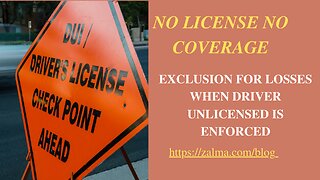 9:22
9:22
Barry Zalma, Inc. on Insurance Law
1 year agoNO LICENSE NO COVERAGE
125 -
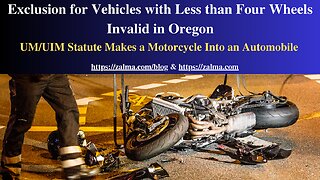 7:05
7:05
Barry Zalma, Inc. on Insurance Law
1 year agoExclusion for Vehicles with Less than Four Wheels Invalid in Oregon
60 -
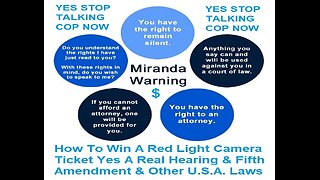 41:23
41:23
What If Everything You Were Taught Was A Lie?
6 months agoHow To Win A Red Light Camera Ticket Real Hearing & Fifth Amendment Other Laws
5.77K6 -
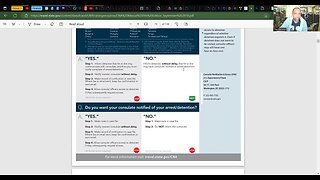 26:26
26:26
The Badwolf
1 year agoREVISITED: Letter on Right to Travel between NC Gov & DOS Dept!! We got the download book.
78 -
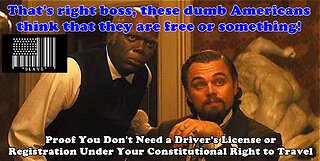 11:07
11:07
Texas Outlaw
1 month agoProof You Don't Need a Driver's License or Registration Under Your Constitutional Right to Travel
1.42K1 -
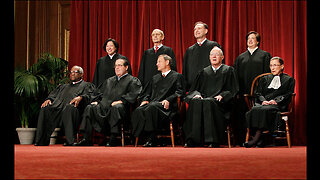 6:51
6:51
What If Everything You Were Taught Was A Lie?
1 year agoStatutes and Codes Are Not Law Corporate Policy Right to Travel and Privileges !
7972 -
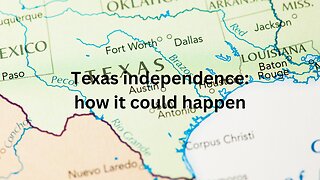 26:45
26:45
Declarations of Truth
3 months agoTexas independence – how?
4192 -
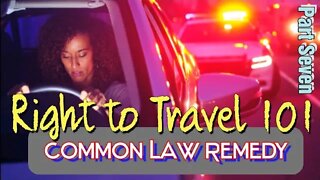 17:24
17:24
Freedom Unchained
3 years ago $0.03 earnedCommon Law Remedy Beat Traffic Tickets The Law On Your Side Part 7
1581 -
 19:41
19:41
The Badwolf
1 year agoRight to Travel: Send your Affidavits and Case Law to the Chief of Police & Etc
51